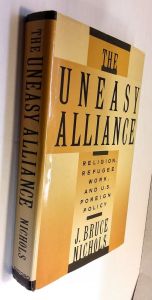Government has become increasingly dependent on the services of religious relief agencies for the implementation of refugee assistance. These agencies are for their part equally dependent on the government for funds, for strategic assistance, and for the freedom to function in many parts of the world. National security and foreign policy considerations often overwhelm humanitarian concerns. A number of hard questions emerge. Do certain religious groups receive preferential treatment for political reasons? Is the church/state relationship abroad compatible with constitutional guarantees of religious freedom? Have the refugees--and the religious groups helping them--become mere political pawns in the global power struggle?
After reviewing the history of U.S. government relations with religious relief agencies, the author closely examines three politically explosive refugee situations: Honduras, Thailand, and the Sudan. As the Sanctuary trials in the United States have demonstrated, treatment of Salvadoran and Guatemalan refugees has been greatly complicated by the conflicting attitudes of liberal religious groups and the U.S. and Honduran governments. By contrast, an evangelical group working with Laotian refugees in Thailand found itself inadvertently embroiled in U.S. policy debates over Laos and Vietnam. While in the Sudan, Nichols discovers close ties between religious relief organizations and the U.S. government in the surreptitious and extra-legal manueverings to remove the Falashas (Ethiopian Jews) to Israel.
Nichols concludes that increasing political and moral disagreement between the government and the religious community now threatens the American tradition of worldwide humanitarian assistance and at the same time mirrors the wider loss of consensus in American foreign policy. He ends on a note of cautious optimism with a proposal for guidelines for responsible future coexistence and cooperation between church and state abroad."







